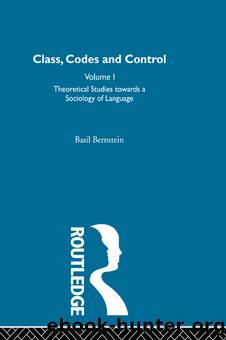Theoretical Studies Towards a Sociology of Language by Bernstein Basil B

Author:Bernstein, Basil B.
Language: eng
Format: epub
ISBN: 978-1-134-41366-9
Publisher: Taylor & Francis (CAM)
Conclusion
Two general linguistic codes or speech-systems have been discussed, their social origins explored and their regulative consequences briefly discussed. It is thought that the theory might throw some light on the social determinants of educability. Where a child is sensitive to an elaborated code the school experience for such a child is one of symbolic and social development; for the child limited to a restricted code the school experience is one of symbolic and social change. It is important to realize that a restricted code carries its own aesthetic. It will tend to develop a metaphoric range of considerable power, a simplicity and directness, a vitality and rhythm; it should not be disvalued. Psychologically, it unites the speaker to his kin and to his local community. A change of code involves changes in the means whereby social identity and reality are created. This argument means that educational institutions in a fluid society carry within themselves alienating tendencies. To say this is not to argue for the preservation of a pseudo-folk culture but is to argue for certain changes in the social structure of educational institutions; it is also to argue for increased sensitivity on the part of teachers towards both the cultural and cognitive requirements of the formal educational relationship. The problem goes deeper than this. It raises the question of a society which measures human worth, accords respect and grants significance by means of a scale of purely occupational achievement.
From a more academic point of view it is tentatively thought that the thesis might well have a more general application. Elaborated and restricted codes and their variants should be found in any society where their originating conditions exist. The definitions should, in principle, be capable of application to a wide range of languages (and to other symbolic forms, e.g. music), although in any one case elaboration and restriction will be relative. The theory might be seen as a part, but clearly not the whole, of the answer to the problem of how the psychic is transformed into the social. The theory is sociological and is limited by the nature of these assumptions. Individual differences in the use of a particular code cannot be dealt with except on an insensitive more-or-less basis. It is also clear that there is more to culture and communication than what might be revealed by a consideration of limited aspects of speech. Finally, it is thought imperative that sociologists recognize in their analyses the fact that man speaks.
Download
This site does not store any files on its server. We only index and link to content provided by other sites. Please contact the content providers to delete copyright contents if any and email us, we'll remove relevant links or contents immediately.
| Anthropology | Archaeology |
| Philosophy | Politics & Government |
| Social Sciences | Sociology |
| Women's Studies |
Good Economics for Hard Times by Abhijit V. Banerjee & Esther Duflo(884)
The Spirit Level: Why Greater Equality Makes Societies Stronger by Richard Wilkinson & Kate Pickett(881)
Villains of All Nations by Marcus Rediker(740)
The Address Book by Deirdre Mask(738)
The Millionaire Next Door by Thomas Stanley & William Danko(727)
The Price of Inequality by Joseph E. Stiglitz(705)
The Address Book: What Street Addresses Reveal About Identity, Race, Wealth, and Power by Deirdre Mask(667)
Good Economics for Hard Times by Abhijit V. Banerjee(634)
Age of Capital 1848-1875 by Eric Hobsbawm(610)
The Great Inequality by Yates Michael D(599)
Classic Writings in Anarchist Criminology by Anthony J. Nocella II(588)
Very Important People by Ashley Mears(586)
Home by eoin(564)
Gilded Lives, Fatal Voyage: The Titanic's First-Class Passengers and Their World by Hugh Brewster(543)
Plutocrats: The Rise of the New Global Super-Rich and the Fall of Everyone Else by Chrystia Freeland(528)
The Hidden History of Monopolies by Thom Hartmann(514)
The Code of Capital by Katharina Pistor(513)
The Privileged Poor by Jack Anthony Abraham(511)
Conscientious Objections by Neil Postman(494)
